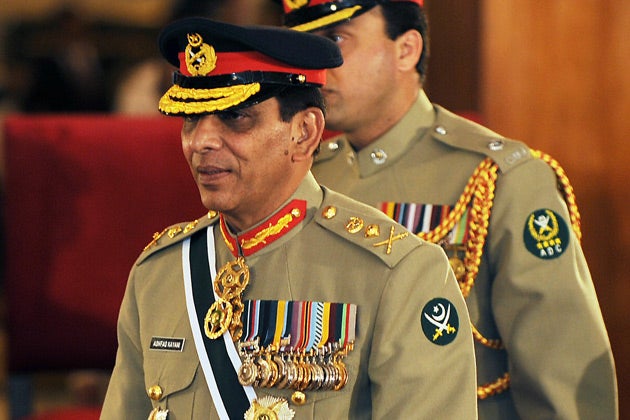Pakistan backs army chief's US rebuke

Pakistan's prime minister today backed a harsh rebuke of the US by the Muslim nation's military chief, a sign of strains in relations seven years after the September 11 attacks forged the two countries' anti-terror alliance.
General Ashfaq Parvez Kayani, the powerful army leader, said nearly a week after a deadly American-led ground assault in Pakistani territory that Pakistan would defend its sovereignty and there was no deal to allow foreign forces to operate inside its borders.
He said unilateral actions risked undermining joint efforts to battle Islamic extremism.
"Falling for short-term gains while ignoring our long-term interest is not the right way forward," Kayani warned in a statement Wednesday.
Prime Minister Yousaf Raza Gilani, in comments reported by state media and confirmed by his office, said Kayani's words reflected government opinion and policy.
The ground assault last week, and a barrage of suspected US missile strikes in Pakistan in recent days, suggest growing American impatience with Pakistan's progress in eradicating militant safe havens in its semiautonomous tribal regions bordering Afghanistan.
US officials say clearing militants from such pockets in Pakistan's northwest is critical to reducing attacks on NATO and American forces in Afghanistan. A Pentagon spokesman would not directly respond to Kayani's remarks, but said the two countries were cooperating.
Still, the Pakistani leaders' comments indicate growing frustration and fading trust in both countries on the anniversary of the attacks in the United States.
Many Pakistanis blame their nation's alliance with the US for fueling violence in their country, while US officials worry that Pakistan's government is secretly aiding militant networks — keeping them as a wedge against longtime rival India.
While Pakistan's government earlier issued strident protests over the ground assault, even summoning the US ambassador, Kayani's statement was significant because he rarely speaks publicly and because he heads Pakistan's most powerful institution.
In his first public criticism of American policy, Kayani indicated he was sensitive to anger among Pakistanis, and possibly even within the military, over the assault and the suspected missile strikes, analysts said Thursday.
"It expresses a deep concern in Pakistan and was quite timely because of the feeling in Pakistan as if the army and the government of Pakistan has surrendered to whatever Americans want to do in the tribal regions," political analyst Rasul Bakhsh Rais said.
Gilani's comments also came as The New York Times reported Thursday that US President George W. Bush had secretly approved orders allowing American Special Operations forces to undertake ground assaults inside Pakistan without getting prior Pakistani government approval.
Asked to comment on the report, the Foreign Ministry referred to Kayani's statement.
US officials have acknowledged that American troops carried out the operation in South Waziristan but have not given details. The mission's goal and results remain unclear. Residents in the area said at least 15 people died.
The cross-border strike also comes at politically sensitive times in both countries.
The Bush administration is on its way out, leading some analysts to speculate it is turning to missiles and ground assaults in Pakistan to try to score some last-minute victories in the face of a growing Taliban insurgency in Afghanistan.
Pakistan, meanwhile, just elected a new president, Asif Ali Zardari, the widower of slain ex-Prime Minister Benazir Bhutto, who is generally considered pro-American and has said terrorism is Pakistan's chief challenge.
Zardari was sworn in Tuesday and visited his wife's grave to pay respects today. He has faced some criticism for not being more outspoken in condemning US strikes in Pakistan.
Meanwhile, residents have found the bodies of two men believed to be among 25 police recruits reported abducted by militants in northwestern Pakistan. The partially beheaded bodies were found in an open area in Orakzai town, said Khan Afzal, the mayor of nearby Hangu district.
Meanwhile, the bullet-riddled bodies of three men active in anti-Taliban activities were found today in the Bajur tribal region, witnesses and officials said.
Government official Jawed Khan said the bodies were found with a letter saying, "This is the result of working against the Taliban and cooperating with the army instead of joining jihad."
Tribal leaders in the Salarzai area of Bajur have denounced the Taliban. Recently, armed tribal members torched and destroyed several suspected militant houses and hide-outs.
Join our commenting forum
Join thought-provoking conversations, follow other Independent readers and see their replies
Comments
Bookmark popover
Removed from bookmarks